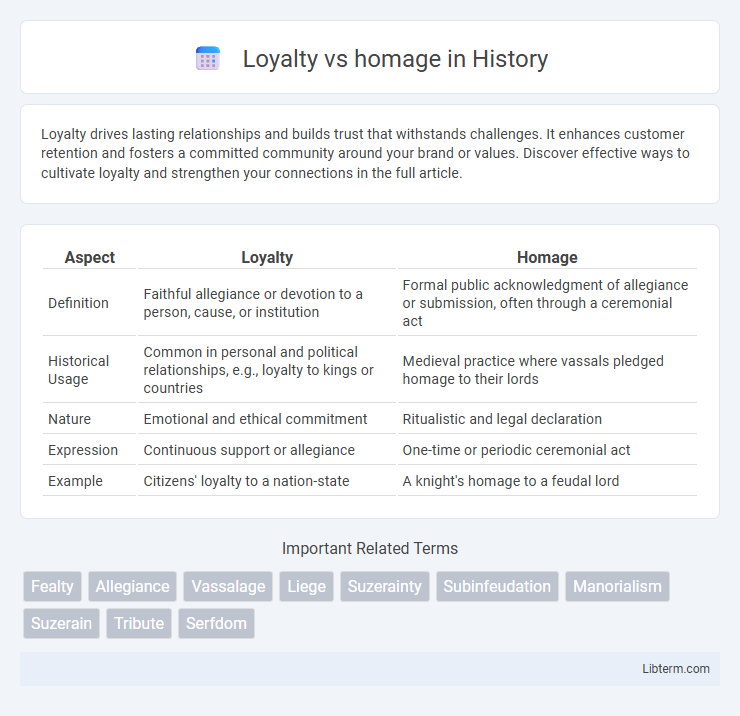Loyalty drives lasting relationships and builds trust that withstands challenges. It enhances customer retention and fosters a committed community around your brand or values. Discover effective ways to cultivate loyalty and strengthen your connections in the full article.
Table of Comparison
| Aspect | Loyalty | Homage |
|---|---|---|
| Definition | Faithful allegiance or devotion to a person, cause, or institution | Formal public acknowledgment of allegiance or submission, often through a ceremonial act |
| Historical Usage | Common in personal and political relationships, e.g., loyalty to kings or countries | Medieval practice where vassals pledged homage to their lords |
| Nature | Emotional and ethical commitment | Ritualistic and legal declaration |
| Expression | Continuous support or allegiance | One-time or periodic ceremonial act |
| Example | Citizens' loyalty to a nation-state | A knight's homage to a feudal lord |
Defining Loyalty and Homage
Loyalty is a steadfast commitment or allegiance to a person, group, or cause often demonstrated through consistent support and trustworthiness. Homage, rooted in feudal traditions, is a formal expression of respect or submission typically shown through ritualistic gestures or declarations. While loyalty emphasizes enduring devotion, homage centers on ceremony and acknowledgment of authority or status.
Historical Origins of Loyalty and Homage
Loyalty originated from Anglo-French and Old French terms emphasizing faithfulness and allegiance, deeply rooted in medieval feudal systems where vassals pledged unwavering support to their lords. Homage, derived from the Latin "homo" meaning man, specifically described the formal ceremony in which a vassal became the lord's "man," symbolizing a personal bond and mutual obligations in the feudal hierarchy. Both concepts highlight the foundational role of personal allegiance and hierarchical duty in medieval European social and political structures.
Loyalty in Personal and Professional Relationships
Loyalty in personal and professional relationships fosters trust, stability, and long-term commitment, which are essential for building strong connections and achieving mutual goals. In professional settings, loyalty enhances teamwork, employee retention, and organizational success by encouraging dedication and ethical behavior. Personal loyalty strengthens emotional bonds, support systems, and reliability, promoting resilience and deeper interpersonal understanding.
Homage as a Social and Cultural Practice
Homage as a social and cultural practice involves public expressions of respect, reverence, or submission to a person, deity, or institution, often symbolizing societal hierarchies and shared values. This ritualized act reflects collective identity and cultural continuity, reinforcing social cohesion through ceremonies, gestures, or formal declarations. Unlike loyalty, which implies personal allegiance, homage serves as a communal acknowledgment of authority and tradition within historical and contemporary societies.
Key Differences Between Loyalty and Homage
Loyalty involves steadfast allegiance and support to a person, group, or cause, often rooted in trust and consistent commitment, while homage is a formal expression of respect or reverence, typically performed through ceremonial acts. Loyalty denotes an emotional or ethical bond that influences ongoing behavior, whereas homage is a symbolic gesture acknowledging status or authority. The key difference lies in loyalty's enduring nature and personal investment versus homage's ritualistic and often temporary display of honor.
The Role of Loyalty in Modern Society
Loyalty forms the foundation of trust and social cohesion in modern society, driving commitment to relationships, organizations, and communities. Unlike homage, which is a formal expression of respect or allegiance often rooted in tradition, loyalty involves ongoing dedication and emotional investment that sustains social bonds. Contemporary social structures, including workplaces and digital communities, rely heavily on loyalty to maintain stability and foster collective progress.
The Significance of Homage in Cultural Traditions
Homage holds a profound significance in cultural traditions as a formal expression of respect and reverence towards ancestors or leaders, often manifested through rituals, ceremonies, and symbolic gestures. Unlike loyalty, which implies ongoing allegiance and obedience, homage emphasizes acknowledgment of heritage and the preservation of collective identity within communities. This practice strengthens social cohesion by connecting present generations with their historical roots and reinforcing shared values.
Loyalty and Homage in Leadership and Authority
Loyalty in leadership reflects unwavering commitment and trust between followers and leaders, fostering a stable and motivated environment. Homage emphasizes formal respect and recognition of authority, often rooted in tradition or societal norms. Effective leadership balances loyalty's personal dedication with homage's ceremonial acknowledgment to maintain both influence and organizational cohesion.
When Loyalty Conflicts with Homage
Loyalty often demands unwavering allegiance to a person, cause, or organization, while homage involves publicly showing respect or reverence, sometimes to a higher authority or tradition. When loyalty conflicts with homage, individuals face ethical dilemmas where honoring established norms may undermine personal or group commitments. Navigating this tension requires balancing sincere respect with a critical evaluation of which entity's interests align most closely with one's core values and responsibilities.
Choosing Between Loyalty and Homage: Ethical Implications
Choosing between loyalty and homage involves weighing personal allegiance against formal respect, each carrying distinct ethical implications. Loyalty demands a consistent commitment to values or individuals, emphasizing trust and moral integrity, while homage centers on ceremonial recognition that may lack deeper ethical substance. Navigating these choices requires assessing whether one's actions uphold genuine ethical principles or merely conform to social expectations.
Loyalty Infographic

 libterm.com
libterm.com